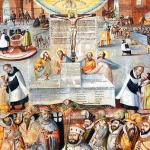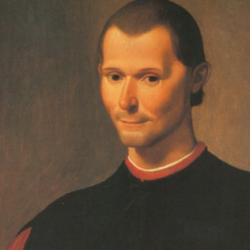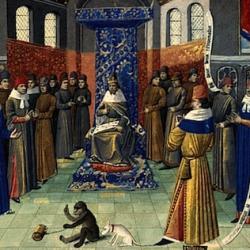The history of the world, proponents of liberalism argue, is the history of the struggle for freedom, the struggle between freedom and slavery. Democracy also sees history as a struggle, in this case the struggle to establish the power of the people.
As Ruszard Legutko (Demon in Democracy) puts it: “the history of the world – in the case of liberalism – was the history of the struggle for freedom against enemies who were different at various stages of history but who perpetually fought against the idea of freedom itself and – in the case of democracy – the history of the a people’s continuing struggle for power against forces that kept them submissive for centuries” (16).
In both, the enemy was tyranny, which has assumed “a variety of additional, distinctive costumes” (16). John Stuart Mill put it dramatically: “The struggle between Liberty and Authority is the most conspicuous feature of history since the earliest times known to us” (quoted, 16). N.B.: Not liberty and slavery, but liberty an authority. Authority isn’t the condition for the possibility of free action, a power that liberates, but an inhibition of liberty, a liberty which is virtually synonymous with autonomy.
Liberalism thus, Legutko argues, has an inherently expansive, imperialist drive. It’s not enough to have institutions of popular rule; it’s not enough to eliminate chattel slavery. Tyranny and authority appear in many different sectors of social life. Authority is pervasive, and so the liberating agenda of liberalism must be equally pervasive.
As Legutko puts it, “Not only should the state and the economic be liberal, democratic, or liberal-democratic, but the entire society a swell, including ethics and mores, family, churches, schools, universities, community organizations, culture,. and even human sentiments and aspirations” (20-1).
Liberalism’s claim to “modernity” comes into play: “The people, structures, and thoughts that exist outside the liberal-democratic pattern are deemed outdated, backward-looking, useless, but at the same time extremely dangerous as preserving the remnants of the old authoritarianism.” They may have to be tolerated for a time, but eventually they’ll have to accommodate or die (21).
So, for instance, “sooner or later a family will have to liberalize or democratize, which means that the parental authority has to crumble, the children will quickly liberate themselves from the parental tutelage, and family relationships will increasingly become more negotiatory and less authoritarian.” Liberalism can come up with no reason “to defend the traditional family,” being as it is “part of the old despotism” that liberalism was established to eliminate (21).
This isn’t an imaginary danger, but has taken hold in European and American law: “allowing increasingly younger girls to have abortions without parental consent, or providing children with legal instruments to combat their claims against their parents, or depriving parents of their rights and transferring those rights to the government and the courts” (22).
Schools too are a bastion of illiberal authoritarianism – teachers telling students what to think and do, and enforcing their lessons with corporal punishment. Schools like families (and like churches) have to “become more and more liberal and democratic” (22).
As these examples illustration, liberalizing institutions doesn’t take place organically. Liberalism is modernization, and some institutions and habits are just going to have to be pushed to get with the program. Liberalization/modernization/democratization may need to be enforced by state power.
Legutko doesn’t think any of this is evidence of “liberalism gone awry.” On the contrary, he sees is as the logical fruit of liberalism’s expansive, colonizing thrust: “Whatever happens in school must follow the same pattern as in politics, in politics the same pattern as in art, and in art the same pattern as in the economy: the same problems, the same mechanisms, the same type of thinking, the same language, the same habits” (22). All this is evidence that liberal democracy becomes “an all-permeating system” (22).
And a system that, as Legutko’s repetition of “same” in the quotation above indicates, that undermines what liberalism claims to offer. It promises diversity but ends with a thin uniformity of thought and habit. As Tocqueville said long ago, the democratic US is the least diverse nation in the civilized world.












